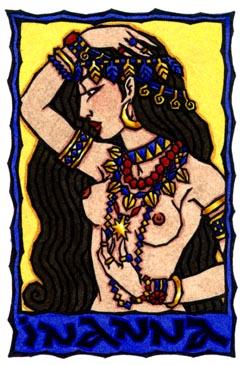
I like calling Paganism the "Old Religion," though I know that's a piece of romantic revisionism. And Diana Paxson nicely states some central tenets, if you will, of our religions: that "Divinity may be worshipped in many forms and by many names; that the physical world is as holy as the spiritual realm; that humankind should live in harmony with nature; and that magical or sacramental practices are effective." I don't know about you, but that sums up my beliefs quite well.
When I start to think about the differences between monotheism and polytheism, the distinction starts to break down. I mean, contemporary fundamentalist Christians believe there is only one God, though they also posit the existence of Satan, who seems like a demi-god to me - a god ultimately less powerful than the Big Guy, but still pretty damn powerful. And what about the Holy Trinity - three gods in one? three aspects of the same god? It's the stuff of theological debates. To Catholics, Mary is the mother of God; does that make her a god, or no? (Of course, we all know who Mary really is.) The ten commandments, important to both Christians and Jews, state that the people shall have no other gods before the God of Israel, which isn't the same as saying there are no other gods. As for traditional polytheists, do the Hindus believe their gods are many or ultimately one? Or both?
Among Pagans, we debate the value of sticking to one pantheon or choosing from among many. We call ourselves polytheists but are less clear about what that means. My own belief tends toward the Divine as both one and many, the great Mystery, known in many guises and by many names. Is that just a holdover from my Christian, monotheistic days, or from growing up in a culture where monotheism is the dominant model? Do I fail to make the necessary imaginative leap to true polytheism? When I think of polytheism, I picture first the squabbling Greeks I learned about in high school, and as much as I groove on the archetypes of Artemis, Demeter, and Hecate, I can't take Zeus and his ilk seriously. Like a lot of Goddess women, I mix my pantheons freely, being partial to the aformentioned Greek goddesses (but not Hera, please, never Hera, and I have some problems with Athena) plus Kwan Yin and Brigid. Since I like my gods to challenge dominant masculine norms, and it took me a long time to divest myself of the idea of big-white-bearded-male-God, I prefer to think of the god in even more abstract and less human terms, as the Green Man and the stag. But ultimately I believe these characterizations of the Divine are limited if useful tools for grasping parts of what cannot be fully understood.




3 comments:
Hello Inanna,
That last bit about choosing a god-form being more difficult-yes indeed!
It hadn't quite crystallised until I read your post, but I've done exactly that-chosen a god-form which is other than completely human (Anubis to be precise), and I wonder how much of that is tied to my rejection of Patriarchal Monotheism?
And, more interesting, how many Pagans do this?
Love,
Terri in Joburg
Good questions!
I understand your reluctance to identify with Hera. But my own mind on this was changed when I read some material about her being a Goddess of the area before Zeus and his brethren came in - like Mary, she was appropriated by the new dominant religion and her power was more or less stripped from her. I can't remember the name of the book I'd really like to recommend re this (it was a 70's era book from a feminist perspective re the Greek goddesses), but the chapter on Hera in Patricia Monaghan's Goddess Path address this point.
Thanks for the tip on Hera, Laura. I have Patricia's book and will have to take a look. Hera's gotten such a bad rap in Greek mythology that it wouldn't surprise me if she'd fallen victim to misogynist retellings of older tales.
Terri - I, too, am interested in how other Pagans, and feminist Wiccans in particular, conceptualize the god.
Post a Comment